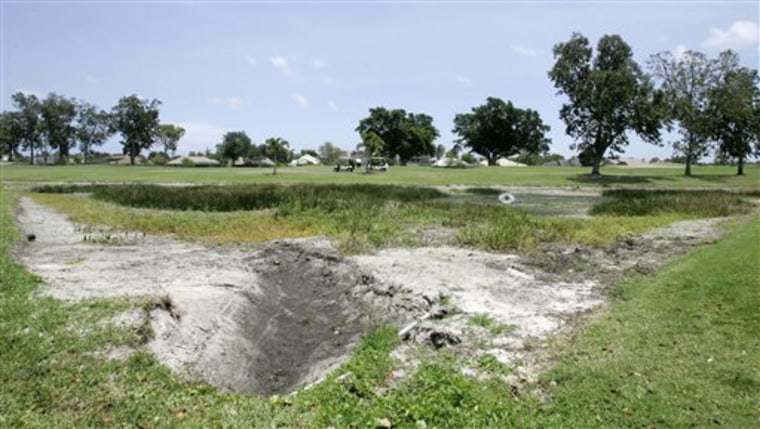The fairways here are flecked, the greens mottled brown. PGA National doesn't look like a marquee golf course under the most severe water restrictions in South Florida history.
"We'll talk to people about it in the pro shop when they check in and say, 'You might notice things are a little bit browner today.'" said Joel Paige, managing director at the course.
South Florida is in an 18-month drought, and signs of the problem are everywhere — from the links to the nursery and sugar cane industries.
Lake Okeechobee, the region's primary reservoir, is down to 9.3 feet above sea level _ less than half a foot above its record low. Farmers and the area's 600 golf courses must use 45 percent less water in the hardest-hit areas, and home sprinkler use is restricted to once a week.
Other Southeastern states, like Georgia, are also experiencing drought. Florida officials say theirs is comparable to one in 2001 that caused an estimated $400 million in agricultural losses.
"We can honestly say this is one of the most severe droughts that we have dating back to when records started in the early 1900s," said Randy Smith, spokesman for the South Florida Water Management District.
Nurseries hard hit
The $15 billion landscaping and nursery industries, which comprise Florida's largest agricultural sector, may be the hardest hit. Most growers are concentrated around Miami-Dade, Broward and Palm Beach counties on the rain-starved Atlantic Coast.
"We can make drought-tolerant and water-efficient plants, and we can put the right plants in the right place, but we have yet to figure out how to make it rain," said Ben Bolusky, executive vice president of the Florida Nursery, Growers and Landscape Association.
Growers are concerned that few people will buy the plants, not that the plants won't survive, Bolusky said. He said residents are inclined to postpone new yard installments if they don't think they can water them. Many people don't realize they are allowed under the restrictions to water new landscaping for a month, he said.
The cane sugar industry is also bracing for big losses. U.S. Sugar Corp. spokeswoman Judy Sanchez said crops were already worse than the 2001 drought, which caused $100 million to $200 million in damages around Lake Okeechobee. The company is the nation's leading producer of cane sugar. A cold weather spell earlier this year didn't help matters.
"We had probably three freeze spells in winter that knocked some of the young cane back to the ground," Sanchez said. "It did not have adequate water, so some of the cane that was frost-damaged has not recovered its growth." Consumers may not see much change in sugar prices because producers elsewhere could fill the void.
Citrus impact next year
Florida's citrus industry could also be affected, but consumers are unlikely to notice until next year. Much of the current harvest is already picked, but the dry weather stresses blooming fruit, said Mike Sparks, head of the grower's group Florida Citrus Mutual.
"When (the bloom) first came out, people said we're going to have a real good crop next year," Sparks said. "Now there's a little more concern in everyone's voice, how much of the crop is going to hold."
Voluntary water restrictions were recommended around the start of this year, and mandatory limits came in March. Tighter clamps were ordered in April, and on Wednesday the toughest restraints in history took effect in some areas, limiting home watering and cutting commercial use by almost half.
Golf courses are forced to spend most of their water on tees and greens, neglecting fairways and other areas.
The new rules will shut off 2 million gallons of water monthly from each of the two golf courses at Broken Sound Club in Boca Raton, director of golf maintenance Joe Hubbard said.
The drought already has taken a toll. One course is 75 percent brown, the other about 20 percent, Hubbard said. The club just hosted a PGA Champion's Tour event in April.
Authorities hope the rainy season, which typically begins June 1, will wash away the trouble, but the area is so dry that even an average summer wouldn't break the drought.
"We've been getting little bits of rain here and there. Every drop helps," Sanchez said. "We're watching the weather reports with an avid interest every day."
